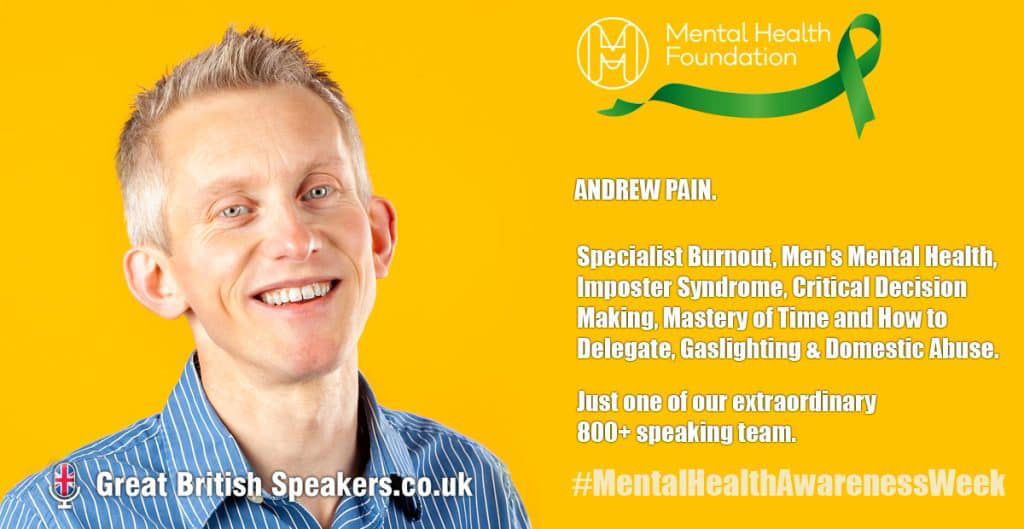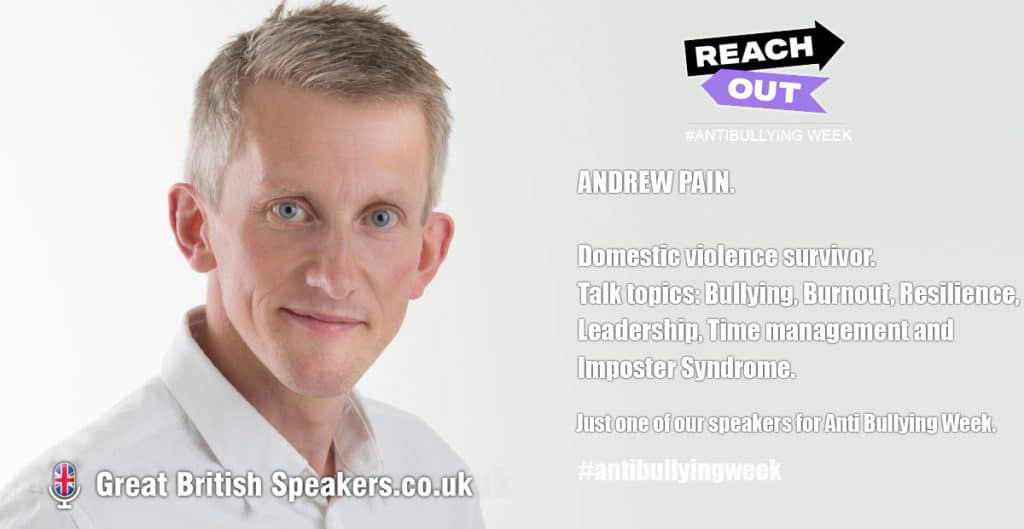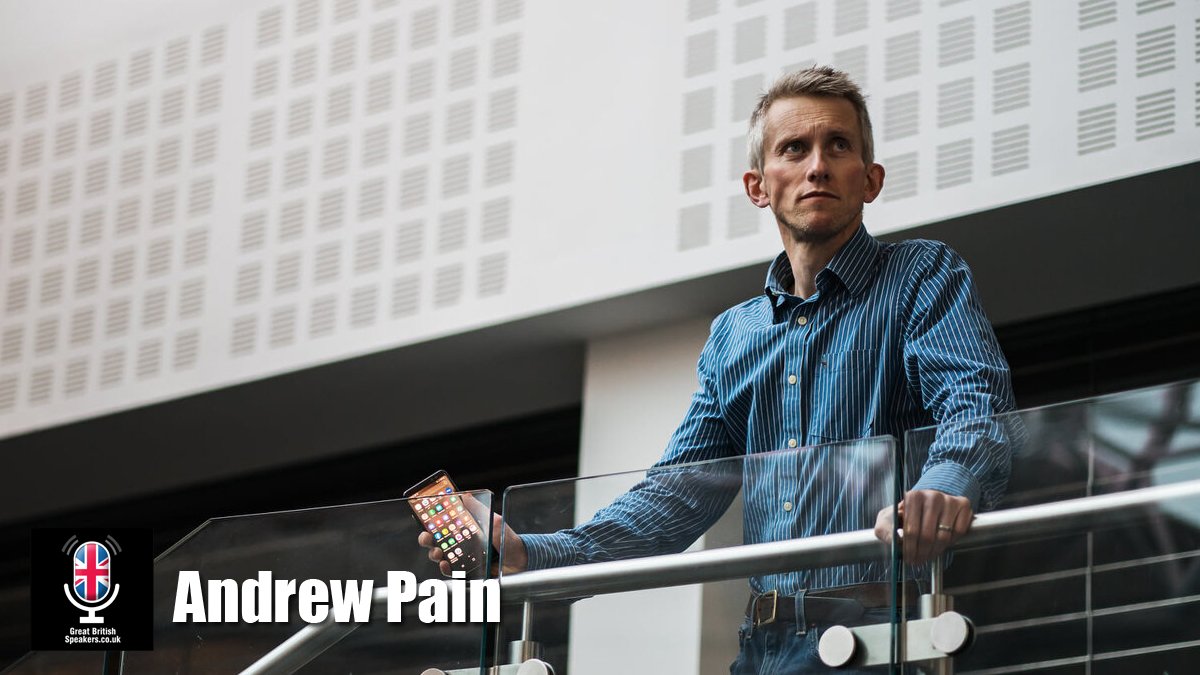

Andrew Pain
Delivering coaching, workshops and keynote talks, Andrew Pain is a CPD-accredited, TEDx and Mental Health speaker and ICF-accredited coach. He is an energetic speaker, on a mission to create decisive and resilient communities, where psychological safety is the norm, the tragic number of suicide victims is reduced to zero, and where diverse communities of people work cohesively as allies. He leads in his work on men’s mental health, burnout, prevention, and overcoming adversity.
Andrew is a hugely relatable speaker, delivering in his own down-to-earth style, exploring tough topics such as men’s mental health, suicide, domestic abuse, toxic masculinity, and gender division, with a frank yet upbeat and optimistic approach.
He is passionate about sharing fresh insights and practical strategies for progress, which people won’t have heard many times before. Whether he is talking about men’s mental health, decision making, burnout, imposter syndrome, or domestic abuse, Andrew delivers ‘refreshingly different’, and it is something which makes him stand out as a speaker.
Contact Great British Speakers today to book domestic violence advocate and burnout keynote speaker Andrew Pain for your next event.
Type Of Presenter
More About Andrew Pain
Born in the UK and raised as a Brummie, Andrew Pain has lived and worked in France, El Salvador and Mexico. From working with street kids, to building homes and teaching English to ex-guerilla fighters, to operating a successful recruitment company from a garden shed in the South of France, Andrew has had his share of ups and downs, not to mention a 10-year abusive and violent marriage.
Andrew Pain graduated with a BA (Hons 2:1) in 1997 from University of Warwick and gained over 20 years HR experience, covering recruitment, coaching and development and organisational development.
He is now a professional speaker and member of the International Coaching Federation, The International Stress Management Association and Professional Speaking Association. Andrew serves diverse clients from Amazon and Specsavers to Public Health Wales and leading Universities, local colleges and secondary schools.
Andrew Pain | TEDx Speaker and Podcaster
Andrew is a TEDx speaker whose talk on men and domestic abuse has over 140K views on YouTube and a podcaster whose podcast, Men on Show, celebrates the stories of men doing amazing things, whilst also exploring their views on modern masculinity, the challenge of Andrew Tate, why men and boys are struggling and how to help men and boys be the best version of themselves.
His TEDx talk ‘Domestic Abuse – not a gender issue’ is a must watch as it explores the stigma surrounding male victims of domestic abuse and the challenge they have in speaking up.
See Andrew Pains Ted Talk on domestic abuse below:
Andrew Pain | Top Keynote Speaker
Andrew has a number of keynote talks but is happy to adapt or tailor talks to the needs of organisations and clients. His main keynotes are:
Andrew Pain Keynote |Domestic Abuse and Coercive Control
Domestic abuse, which includes physical and sexual violence, emotional abuse, coercive and controlling behaviour and economic abuse, will affect 1 in 4 women and 1 in 6/7 men during the course of their lifetime.
There are over 2 million reported cases of domestic abuse each year in the UK alone, with men, women and people from all age groups, ethnicities and cultures as perpetrators and victims.
Domestic abuse reportedly costs the UK economy £66 billion each year, it’s undoubtedly a common factor in driving the suicide numbers for men and women, and so for organisations and wider society, the questions of how to spot the signs early for yourselves and how to look out for one another are hugely relevant.
As a lived-experience survivor of domestic abuse, TEDx speaker and CPD accredited trainer, Andrew Pain will draw on his story, as well as wider research, in order to develop your understanding of how domestic abuse unfolds, the challenges in reaching out for help and how to best support your colleagues.
This keynote explores:
– How people from all walks of life, can easily fall into abusive relationships.
– Why people stay in abusive relationships and become their abuser’s greatest defender and excuse maker.
– The reality of gaslighting: what it is and how it manifests itself in abusive relationships.
– Life after abuse: from personal safety to parental alienation and the family courts, to why the rebuilding process is time consuming and complex.
– What are the red flags of abusive relationships? What should you look out for when forming new relationships, so you could take action early if necessary?
– What are the signs that a colleague/loved one might be caught in an abusive relationship?
– How would you approach someone sensitively, if you suspect they’re caught in abusive relationship, but they may not yet see it for themself?
Andrew Pain Keynote: Men’s Mental Health: Why it Matters and Where to Start
– Over 80% of homeless people in the UK are men
– 95% of people in prison in the UK are men
– 60% of victims of violence in the UK are men or boys, and yet there’s no official government strategy to tackle violence against men and boys. The issue is simply swept up into the official government strategy to tackle violence against women and girls.
– 3/4 of people who complete suicide each year in the UK are men
If we’re serious about addressing men’s mental health, we need to move beyond well-trodden assumptions that ‘Men don’t naturally talk’ or that ‘Men are the architects of their own problems.’ If we’re serious about addressing men’s mental health, we need to ask better questions so that truly, we can safeguard the mental wellbeing of our sons, brothers, dads, uncles, male friends, husbands and partners. We need to ask questions like:
How do we actively support men who are struggling?
What are the barriers/prejudices/stigmas within our society which might hold men back from opening up?
How do we help men to be the best version of themselves?
This keynote explores:
– Why men and boys are struggling, what the data says, and what it means for the next decade?
– The stigmas which hold men back from admitting they’re a victim in any scenario (finance, work, relationships).
– The importance of psychological safety in helping men to talk, and how to create psychological safety.
– Gender bias: what is it and why it’s bad news for both men and women.

– Modern buzzwords: allyship, intersectionality, beta bias, gamma bias. What do they mean? Why do they matter? And how do they affect men?
– How to tackle toxic masculinity, and is toxic masculinity really the most helpful phrase in engaging our men?
– Fatherhood: what are the biggest challenges facing dads today and how do we support fathers? (Including new dads, those who no longer live with their children, those caught in family court warfare, and possibly the victims of Parental Alienation).

– Testosterone: why it is misunderstood and how it impacts male physical and mental health.
– How do we redefine a masculinity which is fit for the 21st century?
Andrew Pain Keynote | How to Stop Burnout, so Work/Life Balance is a Reality, not a Utopia
Regarded by the World Health Organisation as a key driver of workplace absence, and a major challenge for professionals who are striving and copying in our complex 21st century world, there’s little doubt that burnout is a real and present danger, which poses grave consequences for people and organisations who ignore it.
But what is burnout?
What are the triggers?
Is burnout preventable, and if so, how do you stop it?
This keynote explores:
– The most common workplace triggers of burnout and how to deal with them.
– The ‘easy-win’ and ‘wider-scale’ strategies to tackle burnout.
– Why tackling burnout requires a wider focus than simply the work environment.
– How elite performers process and respond to setbacks, using T.E.S.T.
– How to manage long-term worries using The Worry Scale, so you remain proactive about tackling your worries, but without getting consumed by them.
– How to create rhythms and routines which energise in the toughest of times.
– Why boundaries are at the heart of self-mastery, how to create them, and how to adhere to them.
– How to organise your day so you remain focussed on the important things when it’s all kicking off, and make the most of the quieter days when they occasionally arrive.
– GRIT: the forgotten ingredient for developing grit and how to become grittier by nature.
Andrew Pain Keynote | How to Build Thriving Communities
– Nearly one quarter of the world population feels lonely, with the highest levels of loneliness being reported by those between the age of 19-29.
– 15% of men say they have no close friends at all.
– The number of Kudokushi deaths, where the deceased person is not found for months after their death, is rising (according to data from Japan and the UK).
It’s been a turbulent few years for most people around the globe and given that the next 10 years are not likely to be any less challenging than the last 10 years (in terms of geo-political issues, climate change, the pace of modern life and technological change etc) the question of building thriving communities, is urgent and important for all organisations.
Without active communities, issues such as absenteeism, presenteeism, burnout, low morale, working in silos, communication issues, misunderstanding and a high turnover of staff are likely to characterise our organisations.
Social connection is in our human DNA and it’s arguably why homo-sapiens prevailed over neanderthal people when times were tough (the brains of neanderthal people were no smaller than ours, but they were more unsociable than humans and did not form communities as easily)
Given the importance of community, two hugely important questions need to be answered:
– How do you create communities where people belong and can reach out for support?
– How do you break down cliques and reduce levels of loneliness within your organisations?
This keynote explores:
– Why community safeguards human wellbeing, fosters peak performance and supports ongoing innovation.
– Why community spirit is under pressure and what this means for our organisations?
– Cliques: What are they? How do they form? Why are they so difficult to spot?
– How do you start meaningful conversations with someone you might be worried about and/or those people who don’t appear to be approachable?
– Why is loneliness a vicious cycle and how do you get restarted if you’ve become isolated?
– How do you improve your own community building skills … from the small every-day habits, to the longer-term shifts in your thinking?
– What community building lessons can we learn from the very best community developers?
– Psychological safety and Allyship: what are they? And why are they so important for building thriving communities?
Andrew Pain Keynote | Imposter Syndrome: Why it’s Toxic and How to Beat it
Imposter Syndrome: it’s where you doubt your ability, you feel like a fraud about to be exposed, and you believe your accomplishments are not worthy of attention or respect.
According to global research, 70% of us have experienced Imposter Syndrome and according to my own research of over 3,000 working UK professionals, 85% of people have experienced it (and within NHS settings, it’s 100%).
Imposter Syndrome holds people back from achieving their potential, leading to long term anxiety, self-loathing and depression.
This keynote explores:
– The two types of Imposter Syndrome which no-one is talking about: a) why they matter, b) what causes them, and c) how to beat them.
– Three critical assumptions to adopt as your mantras if you want to send Imposter Syndrome packing.
– Three powerful self-management techniques to draw on when you’re feeling inadequate and your confidence is shot to pieces.
– Three everyday habits which most people are unaware they do, but which undermine our self-worth.
– Four common thinking errors which skew our judgement of ourselves and others.
– The four emotional stages most people experience when they receive negative feedback.
– How to process negative feedback, so you’re not consumed by it and can separate the helpful from the unhelpful.
– How to deal effectively with setbacks when your actions were partially to blame.
A Chat with Andrew Pain
As part of our ‘Chat with…’ podcast series at Great British Speakers, our director Jane Farnham sat down with burnout speaker Andrew Pain to talk about his personal experience of domestic violence, safeguarding, stereotypes of abuse, and why it’s important to promote awareness of domestic violence. Read more HERE.
Andrew Pain’s clients include Lloyds Bank, Balfour Beatty Kilpatrick, IOD, CIMA, Pinsent Masons, APM, NHS, TEDx, The Good Men Project, ROSPA, BBC, FSB, Project Management Institute and Optimus Education.
Andrew Pain has experience in business workshops, keynote speaking, conference speaking, corporate events, leadership talks, private events, motivational speaking, public speaking and virtual events.
Call +44 1753 439 289 or email Great British Speakers now to book domestic violence speaker Andrew Pain for your corporate event.
Get In Touch

Similar Talent
VIEW MORE- Original Top Gear STIG
- Former F1 Driver
- Road Safety Advocate
- Corporate Motorsports After Dinner Speaking




